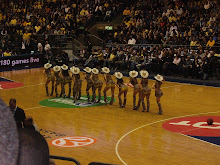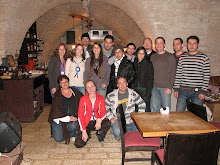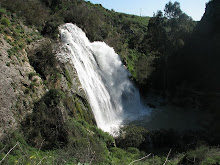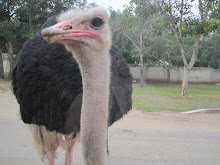Wow - it just dawned on me that it's been over a month since I updated my blog. (well, at least verbally). Many posts have been written in my head but sadly never made it to the keys. That's what happens when I feel like I'm always tired, I guess.
My father and stepmother have come and gone, in an incredible 2-week visit, deserving of its own post. Suffice to say for now that it was wonderful and comforting in a heartbreaking way to have them here. There's no better feeling than suddenly seeing your family on the familiar Tel Aviv streets - a shocking juxtaposition of the most familiar thing in the world in the most out-of-place setting. That is the stuff tears of joy are made out of. We spent an incredible Shabbat sight-seeing in the Golan (I posted pictures) and another Shabbat relaxing in Tel Aviv with friends. I feel like every time a loved one departs Israel my heart breaks a tiny bit, and each time Tzahi slowly picks me up and puts me back together. And yet every time I see another familiar loved face arrive in Israel, my heart surges in strength. It's a continual evolution; I hope Tzahi doesn't get tired of it! :-)
But in this post I want to digest the scene I just departed from - the Passover seder with Tzahi's family in Jerusalem. It was simply delightful. First of all, it was one of my rare tastes of Jerusalem from a secular point of view. Most of my visits to Jeursalem are spent with my religious friends who live there, and I don't often see the secular side of the city. Tzahi's grandparents - the grandmother immigrated from Romania and the grandfather from Turkey - live in a new housing development at the top of one of the highest hills in the city, which of course boasts a picture-perfect view both day and night. With the scenic location, however, comes cold winds. I would not want to live in Jerusalem - I didn't leave Boston to live anywhere less warm than Tel Aviv! We were a group of 18 people and I can honestly say I truly enjoyed the company of each and every one of them. The seder was not very different from most seders I've been to - the exception being the rice and hummus on the table, since their tradition allows for kitniyot. Tzahi brought his guitar and we sang songs around the table for hours. As the 20 bottles of wine started to take their toll on us, we cleared out the long table and began setting up camp in the living room. It was like a kibbutz, I'll tell you. Tzahi's sister and fiance were already falling asleep on the blow-up mattress, I was ready to pass out on my own portable mattress, while the grandfather and great-grandfather were engaged in a conversation on the couch beside me, and the 2-year-old girl wandered from lap to lap, too stimulated by all the action to go to sleep. Slowly slowly enough makeshift beds were made and we turned off the lights, and the group of us fell asleep together, like I did in summer camp as a girl. It felt disconcerting at first, and then comforting. That was until 7am when the sun and the two-year-old rose up and my hopes for continued sleep were permanently dashed. but that's ok. I had a chance for an afternoon nap after our tiyul to the old city and the kotel after lunch.
Like most of my experiences here in Israel, the language barrier runs through everything. It is everywhere, inescapable. It's like I have one leg, one arm, and one half of my face in the room, and the other half of my body caught in the door. I am a part of some conversations and not others. I can understand some members of the family and not so much others. When I was trying to get ready for bed and everyone was chattering away around me, I focused on reading my book. Tzahi's cousin asked me how I could concentrate on reading with all the noise, and I told her, it's hebrew. It takes effort to understand. If I want, I can turn off my head and not understand a word of it. I think that surprised Tzahi. But it's true. And the constant translation. Constant, constant, constant. Both my asking Tzahi and him asking me - and so many words turn into a discussion. Like how do you define what "literally" means? or "impact" or "buffalo soldier" or "jamming" or so many other words - it's just endless. Until either Tzahi or myself becomes fluent in the other's langugage, the translation discussions will be endless. Most of the time, it's easier just to do the fake smile. I had a talk with my friend Aliza about this, because she's American and over time became fluent in Hebrew. She told me the "fake smile" is a stage you go through in the process of becoming fluent, and I'll get past it in about another year or so. But it's an inevitable stage of the process. It's the point you reach when you can't ask everyone to translate every word they're saying - it's simply too tiring. and you can basically follow the conversation, albeit four seconds behind. So when the group bursts into laughter, you do too. You'll get there eventually, she tells me.
Hanging out with Aliza I realized I almost never hang out with Americans anymore. I guess I got into the habit because I wanted to surround myself with Israelis to acclimate and immerse in Hebrew. But then when I was hanging out with a group of Americans the other day, and realized how comforting and enjoyable and EASY it was, and that I find their jokes funny and vice versa, I realized I really miss this. I miss being around Americans. I need to do it more. It's good for my soul. So that's one of my new resolutions - to find the right balance of time with Americans and Israelis. I really am split down the middle.
After having gone with Tzahi to his office holiday party where they had a stand up comedian perform, I know that will be the ultimate milestone. The day I can attend an Israeli comedy show is truly the day I'll be a fluent Hebrew speaker. Until then, I can always try to laugh at myself :-)
Tuesday, March 30, 2010
Subscribe to:
Comments (Atom)



































































































































































